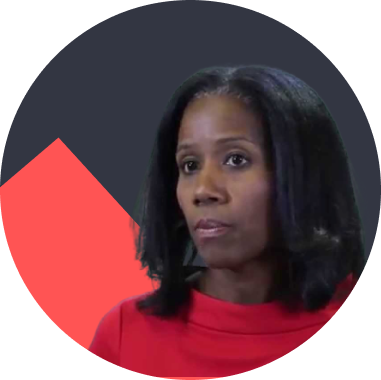Shaping Our Vision with
Dr. Stacy Higgins

A Conversation with Dr. Stacy Higgins
“Everybody has something that they’re really passionate about, and if you can discover what that is, and then make it meaningful to the institution where you are, then you are golden!”
Bio
Stacy Higgins, MD, is a Professor of Medicine and Director, Primary Care Internal Medicine Residency Program at Emory University. Over the last 20 years, Dr. Higgins has pursued her passion for leadership in medical education and has led research on a variety of topics including humanism, reflective learning, mentorship and diversity. She founded the Women’s Clinic within the Grady Primary Care Center and the International Medical Clinics which provide care to underserved populations. She is the recipient of a number of prestigious awards including the American College of Physicians (ACP) W. Lester Henry Award for Diversity and Access to Care and Emory University’s prestigious Papageorge Distinguished Teaching Award.
How do you define success and what does it mean to you?
“For me personally, having success meant first figuring out right out of residency what my area of focus was going to be. I knew that I wanted to be within medical education.”
Dr. Higgins continues, “I will say alongside that, for me personally, being successful also meant having a good balance between my home and work life. And while my professional life was extremely important and what I was doing was extremely important, I never wanted to sacrifice what was going on in my personal life for advancement at work.”
What is reflective learning and how have you utilized it in your career?
“It’s really thinking about what I learned today at work. How is that going to change? What do I do with my patients tomorrow? What did I do to make somebody else’s life better? And it can be things as simple as, this person was lost in the hospital and really looked distressed and I took a minute to walk them to where the correct elevator was, so they could go and visit their loved ones. Or this medical student was confused about this particular point or felt nervous about their first presentation. Taking a minute to giving them feedback was really meaningful for me.”
“When I think about reflection, it’s reflecting on those small moments that happen during the day, which turns into weeks, which turns into years, to show how you have grown over time. And now you’re going in the direction you want to go.”
What are some of the life lessons you learned early on that stayed with you?
“I grew up in New York City in the borough of Queens, New York. It definitely shaped who I am today.”
“I will say there are teachers who influenced me throughout my elementary, middle, and high school experience. People I can look back on still and say, that was an amazing class. They were so available to me as a learner. I went to a math and science high school and I had the opportunity to take hands-on honors science classes with people who were passionate about what they were teaching. So not only did I learn the content, but I also had early mentorship and people who were pushing me at a time when there weren’t that many people who looked like me in the sciences.”
“To look at a young Black girl, from a single parent household in a working-class neighborhood and encourage her to say, yes, you can go on to be a physician! There weren’t a lot of people in my life who did that, but the ones who did, I still remember thinking about them and then seeing things within me that I may not have seen in myself.”
As a black woman, how did mentorship play a role in your life and how was it different from someone of a majority group context?
“I believe I have had mentors who are from the majority group for sure who have helped me along the path. And I’m a big believer in having more than one mentor because you get things from different people. But I will say for underrepresented groups, in my career, I have had limited access to mentors that looked like me.”
“I do think there are issues specific to women, specific to underrepresented minorities, specific to first gen students. That if you have not been in that situation, you may not understand or even think to ask about issues that are particular in those areas.”
“And how to utilize everything that’s around you in order to be successful and to keep moving forward. For me, I feel very indebted to the people who were underrepresented, who served as mentors for me. I definitely feel like one of my roles is to mentor other underrepresented students and residents and junior faculty members as they come up through the ranks.”
What are the traits and habits of the most successful students and residents who you’ve trained?
For Dr. Higgins, three instantly came to mind. “One, figure out what your passion is. Everybody has something that they’re really passionate about, and if you can discover what that is, and then make it meaningful to the institution where you are, then you are golden!”
A second point Dr. Higgins considers important is for students and residents to find someone who is going to advocate for them. And third, Dr. Higgins urges students and residents to find those mentors who can help them shape what their vision looks like, all the while realizing this will shift over time.
After some reflection, Dr. Higgins closed out the interview with this important thought, “I think one thing that I wish I’d known early on is that you don’t have to have the perfect vision in order to go and sit down and talk with a mentor. The role of your mentor is to help you sort that out. I think that’s really important. It’s okay to just have some ideas, to have somebody to bounce those ideas off of who can help guide you and move them forward is really important to remember.”
Pearls of Wisdom
- Be a reflective learner. Ask yourself daily – what did I do today? How will it change what I am going to do tomorrow?
- Discover your true passion. Everybody has something that they’re really passionate about. Work hard to discover what that is and then make it meaningful to the institution you are at.
- You don’t have to have a perfect vision in order to sit down and talk with a mentor. The role of a mentor is to help you sort that out. Don’t delay mentorship.
